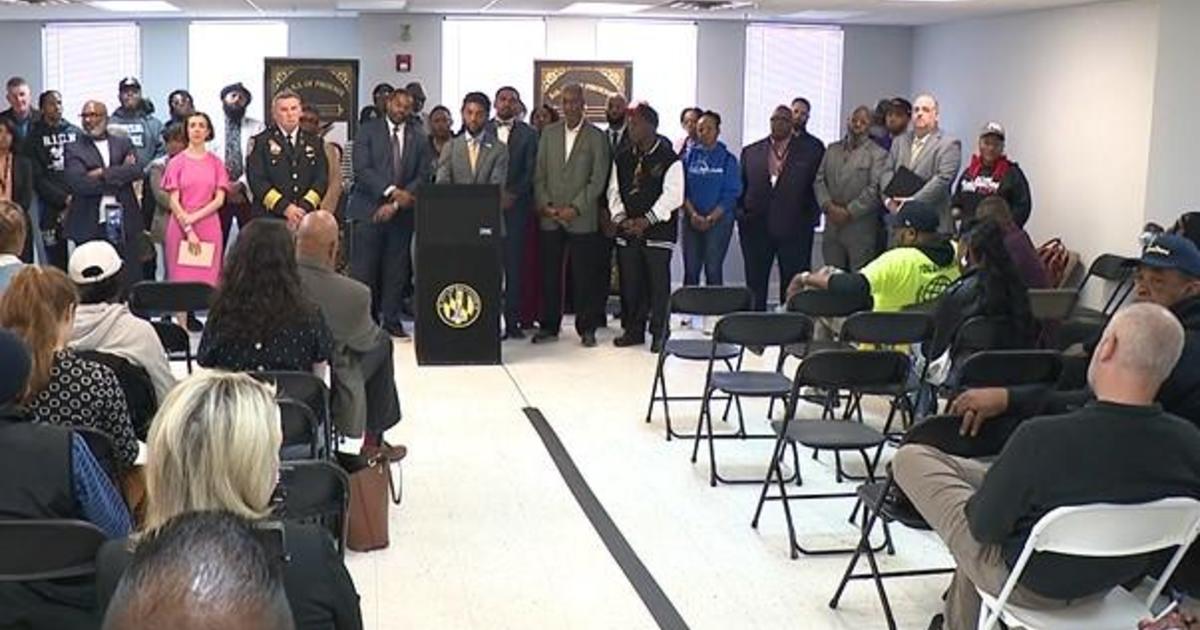Baltimore Announces Major Reforms To Police Search, Arrest Policies As Maryland Considers Banning No-Knock Warrants, Chokeholds
BALTIMORE (WJZ) — Baltimore City's police commissioner announced new reforms Wednesday including revised policies on how officers stop, arrest and search citizens.
"To be clear, these policies do not handcuff our police officers. Quite the opposite, our new policies are trying to guide officers on how to fight crime while building public trust," Commissioner Michael Harrison said.
Harrison said he aims to "end the over-enforcement of minor violations that have damaged community trust and collaboration."
Here is one of the new policies involving police stops. You can find the whole list of BPD policies here.
The department revamped the policies with input from the community, and the changes are part of a federal consent decree which began after a Department of Justice investigation showed widespread police abuses following Freddie Gray's death in custody in 2015.
Baltimore City Mayor Brandon Scott said he is "fully committed" to the consent decree reforms and plans to hold public briefings four times each year.
He said the reforms with citizen input are "something that a young Brandon Scott would never have thought possible in the city of Baltimore."
According to the new policies, officers are not allowed to chase someone just because they run away. Police are also not allowed to threaten or force someone to answer questions or target people for drug arrests simply because they're known to be struggling with addiction.
Commissioner Harrison spoke before a Maryland House committee this week. The General Assembly is considering statewide police reforms. They include banning no-knock warrants and chokeholds—and mandating body cameras for every department.
"I am not someone who hates the police, but over the years I've had my own experiences with law enforcement as have my brothers and my two sons. This has called into question the way that we as a state and a society have empowered law enforcement officers to execute their duties," said House Speaker Adrienne Jones, a Democrat from Baltimore County.
The Speaker told lawmakers, "Police departments are public assets. They are paid for by all of us, and they should be accountable to all of us."
The Washington Football team's Chase Young, a Maryland native, testified in support of the reforms.
"If I do drive up to 7-11 in my nice Mercedes, why are you giving me this look?" the NFL standout asked.
He said he has law enforcement in his own family but "was still worried about the own police that were in my community." Young told delegates he becomes "numb" to some of what he has seen and heard.
A sticking point to those reforms is repealing the Law Enforcement Officers' Bill of Rights(LEOBR), which gives police certain protections if accused of wrongdoing.
Rebecca Smith, an attorney for the Maryland Troopers' Association said the repeal was "a significant problem" and would cause more than "one hundred separate processes" for discipline across the state. She said the current LEOBR should be "reviewed instead of thrown away."
Harrison says he needs more authority to discipline officers. "As the police commissioner, that I have—as any CEO—the final say on discipline, and that I am able to take disciplinary action against members of our department when they step outside of the law, training and policy—and when the actions are so egregious, I can take swift and decisive action."
The Baltimore Consent Decree Monitoring Team issued the following statement on the newly revamped Baltimore police policies:
"The Baltimore Police Department's completion of training and corresponding activation of revised policies on stops, searches and arrests are an important milestone along its path to Consent Decree compliance. In its investigation in 2015-16, the Department of Justice found that BPD was engaged in an unconstitutional pattern-and-practice of stopping, searching and arresting Baltimoreans without legal justification and based on their race. Perhaps more than anything else, it was this pattern-and-practice that reflected BPD's "warrior" policing culture and eroded community trust.
Now is when the rubber meets the road: BPD must show that its new policies and training are having a measurable, tangible impact on the street—that its officers are treating community members with respect and carrying out their core law enforcement duties fairly and constitutionally. Particularly with the implementation this spring of BPD's new record management system, which at long last will enable comprehensive assessment of officer actions in a relational electronic database, the Monitoring Team will focus increasingly on evaluating BPD's stop, search and arrest practices. Improvements in this area are indispensable to building BPD's legitimacy, fostering community trust and, ultimately, achieving compliance with the Consent Decree."
Get alerts from WJZ first! Follow WJZ on Facebook and download the app.



